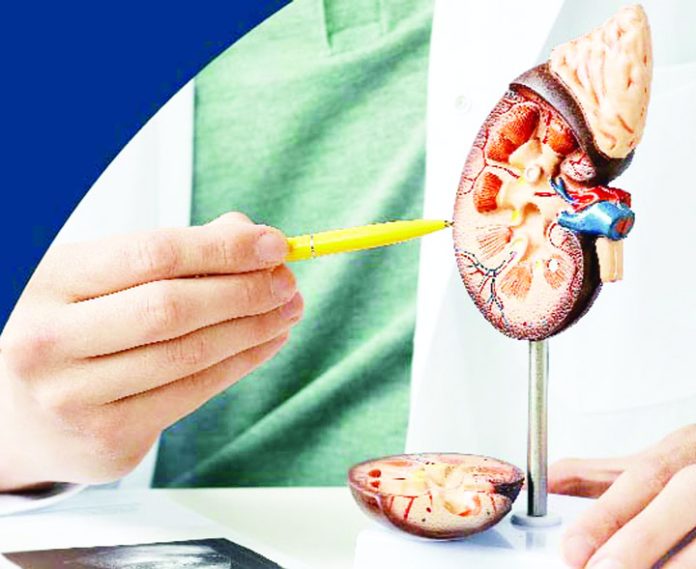Dr Dushyant Kamal Dhari
Kidney stones, one of the most painful urologic disorders, have a history of more than 7,000-years in an Egyptian mummy. Even now, statistics indicate that more than 600,000 patients went to emergency rooms for kidney stone problems and it included more men than women. Though most of the kidney stones pass out of the body without any intervention by a physician but a few become serious concern.
What is a kidney stone?
Urine has various wastes dissolved in it. When there is too much waste in too little liquid, crystals begin to form. The crystals attract other elements and join together to form a solid that will get larger unless it is passed out of the body with the urine. A kidney stone is a concretion formed by the deposit of one or more of such solid constituents of the urine. It may be single or multiple. All are radiopaque except for uric acid stones and are therefore visible by routine abdominal radiography.
Are all kidney stones alike?
There are four major types of kidney stones. The most common are Calcium oxalate, while others are struvite, uric acid and cystine stones. In our area, oxalate stones are most common in patients.
What causes kidney stones?
Causes
* Over saturation of urine which may be due to Too little urinary output.
Increased amount of stone constituents excreted over a period of time such as calcium, oxalates, urates etc.
Altered urine ph: Below ph of 5.5, uric acid crystals predominate as it decreases the solubility of uric acid. High urinary ph favours formation of calcium phosphate and struvite stones.
*Dietic :-
a. Vitamin A & B6 deficiency predisposes for stone formation.
b. Increased intake of foods rich in calcium, oxalates & purines.
* Hereditary.
* Chronic urinary tract infection.
* Prolonged immobilisation from any cause.
* Hot weather.
What are the symptoms?
Many stones are asymptomatic until they begin to move down the ureter, causing pain due to obstruction. Pain is the main complaint. Typically, a person feels a sharp, cramping pain in the back and side in the area of the kidney or in the lower abdomen. Sometimes nausea and vomiting occur. As a stone grows or moves, blood may appear in the urine. If fever and chills accompany any of these symptoms, an infection may be present. Offensive or cloudy urine is an additional symptom.
How are kidney stones diagnosed?
The commonly visible kidney stone symptoms include
* Blood in the Urine
* Pain while urinating
* Severe discomfort in the back or lower abdomen
They are diagnosed by their presence in the X-ray or Sonography or an IVP.
Recurring stones also warrant an investigation into possible parathyroid gland disease.
Management
Diet for kidney stone patients:
Not- Advisable:- Palak, Tomato, Amla, Chickoo, Cashew nut, cucumber, black grapes strawberries increase oxalates.
Advisable: – Coconut water, barley, corn silk tea, pineapple juice, bananas, almonds, carrots, Karela, kulthi dal.
Other Preventive measures:-
* Increasing fluid intake: Patients should try to drink enough liquids throughout the day to produce at least 1200 ml of urine in every 24- hour period.
* Avoid dairy products: If you are on calcium supplements in hopes of strengthening your bones, you may actually be increasing your risk of stone formation. Dairy products are the greatest dietary source of calcium.
* Vitamins – “B” fortified. Vitamin B6 reduces the risk of stone formation.
“C” less. People prone to kidney stones should stay away from vitamin C supplements.
Exercise: Regular exercise also lessens the risk of stone formation.
Role of Homoeopathy
The allopathic system offers surgical removal of stones as the major approach for kidney stones and due to various reasons patients are looking for a treatment approach that is non-invasive, effective, uses a natural healing process, and has no adverse reactions. An increasing percentage of people with stone-associated issues are exploring Homoeopathic system of medicine for treatment. In homoeopathy there are many medicines which can relieve pain, break the kidney stones and flush them outside kidney also. Homeopathic medicines for kidney stones first will help to remove the stones which are there in the urinary tract either by crushing them to fine sand-like particles or in some cases they are in the intact state. Secondly, they can completely remove the tendency towards the stone formation in the near future. Homoeopathic treatment is also recommended for recurrent stone formation. So, homeopathy is effective in the fragmentation of stones, ejection of kidney stones and recurrence of them and remains one of the most popular treatments for this.
As in Homoeopathic system, each patient is regarded as a unique individual so the selection of medicine, dose, potency and repetition should be under the supervision of a Homoeopathic physician so that benefit is derived at the earliest.
(The author is Homoeopathic Physician Specialist)
Trending Now
E-Paper


